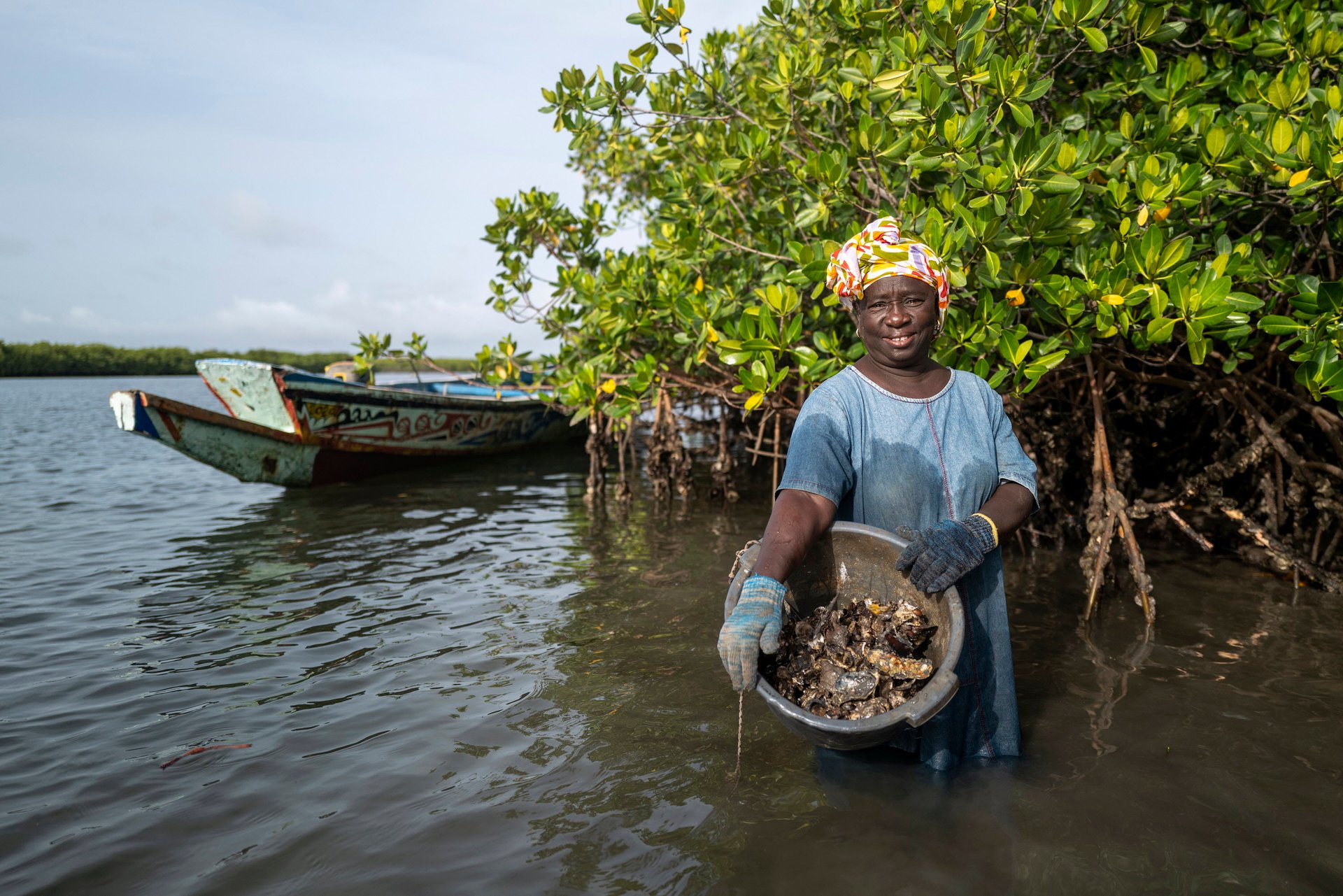May 30, 2025 | 18:47 GMT +7
May 30, 2025 | 18:47 GMT +7
Hotline: 0913.378.918
May 30, 2025 | 18:47 GMT +7
Hotline: 0913.378.918

Fatou Diene, an oyster farmer in the mangroves near Dionewar Island, Senegal.
The world is making progress towards ending the loss of mangrove forests, according to a new report from the Food and Agriculture Organization of the United Nations (FAO).
Found on the coastlines of 123 countries worldwide, over 20 percent of mangroves are estimated to have been lost globally over the past 40 years, mainly due to both human activities and natural retraction.
The World’s Mangroves, 2000–2020, launched today on the International Day for the Conservation of the Mangrove Ecosystem, reports that the total global area of mangroves in 2020 stood at 14.8 million hectares.
But while 677,000 hectares of mangroves were lost between 2000 and 2020, the rate at which they are disappearing fell by almost a quarter (23 percent) in the second decade, according to the report.
The study also reveals that mangroves, unlike other forests, can spread very fast given the chance.
Some 393,000 hectares of new mangrove forests - an area equivalent to 550,000 football pitches - have grown in areas where they were not present in 2000, offsetting more than half of the global loss in the last 20 years.
Asia, which hosts almost half the world’s mangroves, showed a 54 percent decrease in mangrove area net loss in the last twenty years. Net loss also decreased in Africa, while North and Central America reversed the trend and recorded a mangrove area net gain between 2010 and 2020. Increases in net loss were reported in South America and Oceania in the same period, however.
“This new study shows positive steps countries are taking towards slowing the loss of mangroves, but also underlines that we must continue to prioritize their restoration, sustainable use and conservation to safeguard their critical services for people and the planet,” said Zhimin Wu, Director of FAO’s Forestry Division.
“Mangroves have a vital role to play in helping achieve the Sustainable Development Goals, providing food and livelihoods for coastal communities, protecting our coastlines against natural disasters, storing carbon, mitigating climate change, and harbouring an extraordinary range of biodiversity,” he added.
Drivers of loss and gain in mangrove areas
Providing some of the most detailed information yet on what is happening to the world’s mangroves, the FAO study combined remote sensing satellite imagery and local expert knowledge to collect and analyse data across five regions over the 20-year period, including on the drivers of mangrove loss.
While most aquaculture practices do not affect mangroves, pond shrimp aquaculture, one of the main causes of mangrove loss, went from causing 31 percent of all loss between 2000 and 2010 to 21 percent between 2010 and 2020, according to the report.
Natural retraction was the second most important driver of mangrove loss, causing 26 percent of loss over the 20-year period, at least partly caused by intensifying impacts of climate change such as rising sea levels and temperatures.
Natural disasters accounted for only 2 percent of all loss over the 20-year period. However, the area they destroyed increased threefold and is expected to worsen, the report warns, leaving coastal communities even more vulnerable to storm surges, floods and tsunamis.
In terms of drivers of mangrove area gain, natural expansion accounted for 82 percent of all the gains in mangrove area over the two decades, and restoration for the remaining 18 percent.
Building on progress made
The findings of the study will help inform more targeted strategies for ending mangrove loss in different parts of the world.
The publication recommends that efforts to address land-use drivers of mangrove loss should continue, directing agricultural development to conserve remaining mangrove forests and promoting their sustainable use as well as livelihood support for coastal communities.
Priority should also be given to mangroves in restoration initiatives, which should focus on creating conducive conditions for mangroves to naturally colonize suitable habitats, leveraging and contributing to the UN Decade Ecosystem Restoration 2021-2030.
And as mangroves are among the most carbon-rich ecosystems on Earth, storing an estimated 6.23 gigatonnes of carbon worldwide in their biomass and soils, they should also be further emphasized in climate mitigation strategies, according to the publication.
The report will be officially launched later today at a joint FAO-UNESCO celebration of International Day for the Conservation of the Mangrove Ecosystem at the 6th International Mangrove Macrobenthos and Management Conference in Cartagena, Colombia.
(FAO.org)

(VAN) Vikas Rambal has quietly built a $5 billion business empire in manufacturing, property and solar, and catapulted onto the Rich List.

(VAN) Available cropland now at less than five percent, according to latest geospatial assessment from FAO and UNOSAT.

(VAN) Alt Carbon has raised $12 million in a seed round as it plans to scale its carbon dioxide removal work in the South Asian nation.

(VAN) Attempts to bring down the price of the Japanese staple have had little effect amid a cost-of-living crisis.

(VAN) Fourth most important food crop in peril as Latin America and Caribbean suffer from slow-onset climate disaster.

(VAN) Shifting market dynamics and the noise around new legislation has propelled Trouw Nutrition’s research around early life nutrition in poultry. Today, it continues to be a key area of research.

(VAN) India is concerned about its food security and the livelihoods of its farmers if more US food imports are allowed.